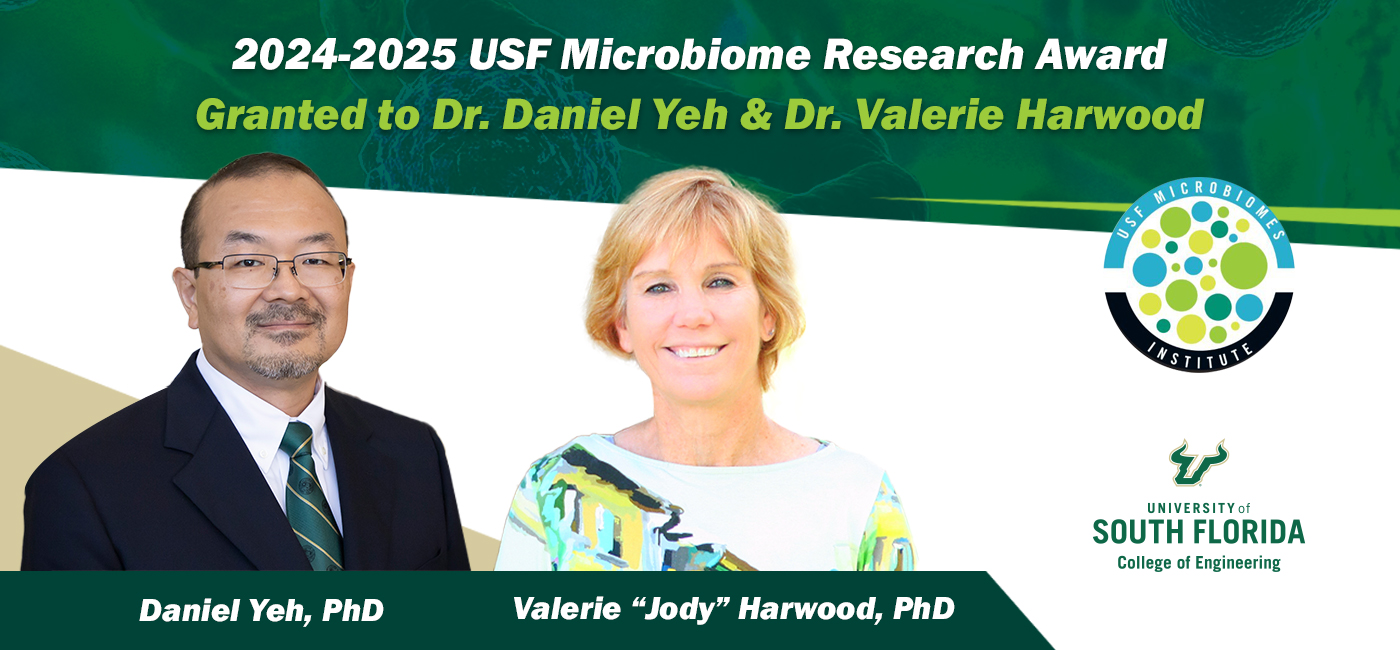Daniel Yeh (CEE), Professor of USF’s Environmental Engineering, has been named the principal investigator on a project that was recently awarded one of the 2024-2025 USF Microbiome Research Awards. The project, titled Developing Sustainable Wastewater Treatment Systems for Lunar Habitats: Enhancing Membrane Bioreactor Stability and Microbiome Viability, focuses on advancing wastewater treatment technology in extraterrestrial environments, specifically for future lunar habitats.
The award, which provides $25,000 in support, includes $20,000 in cash and $5,000 in in-kind services from the USF Microbiome Institute Core Facility. The funds will be used to develop novel methods for treating wastewater in extreme conditions, such as those found in space environments, while also enhancing the viability of microbiomes involved in the treatment process.
The overarching goal of the project is to ensure the stability and efficiency of membrane bioreactors in low-gravity environments, while also maintaining the health of the microbiomes that play a vital role in breaking down waste. The development of such systems is critical for long-term space missions, particularly as NASA and other space agencies look toward establishing sustainable human habitats on the Moon and beyond.
The Team
"The USF Microbiome Research Award provides a tremendous opportunity for interdisciplinary work between environmental engineering and microbial ecology. We will leverage the funding to utilize cutting-edge tools at the Microbiome Institute to gain better understanding of the complex, unique, and diverse microbiomes that exists in a wastewater treatment bioreactor system. The project will lead to better environmental technologies for sustaining life on Earth and beyond," said Daniel Yeh.
Valerie "Jody" Harwood, associate dean of graduate studies and professor in the Department of Integrative Biology, serves as the project’s co-principal investigator. Harwood focuses on water quality microbiology and microbial ecology, water quality, and more. Her lab is known for its work on microbial source tracking (MST).
“It is very exciting to work with this interdisciplinary team on a project that could improve the likelihood of colonizing the Moon and Mars. We are grateful to the USF Microbiome Institute for funding the work," Jody said about the project.
Alexandra Smith, a PhD student and Graduate Research assistant for the USF Membrane Biotechnology Lab, was co-advised by Yeh and Harwood. Alexendra played a pivotal role in the project's development and spearheaded the successful proposal. Smith will also be leading much of the research as part of her doctoral studies.
"I am beyond excited to be working on this project! Huge thanks to the USF Microbiome Institute for the opportunity to have access to their expertise and sequencing technology. We get to dive deep into the community structure of these tiny waste reducing workhorses and learn more about who they are. Who wouldn’t want to say their PhD involved training poop loving microbes to be astronauts?!" said Alexandra.
Support from USF’s Microbiome Research Program
The USF Microbiome Research Awards are designed to support innovative projects that explore the role of microbiomes in various systems, from human health to environmental applications. This particular award not only provides financial support but also grants the research team access to the advanced resources of the USF Microbiome Institute Core Facility.
Led by Hariom Yadav, PhD, the Microbiome Institute offers state-of-the-art equipment and expertise for microbiome analysis. The facility’s resources will be instrumental in helping Yeh, Harwood, and Miss Smith gather preliminary data that can be used to apply for larger federal and state grants.
The USF Microbiomes Institute announced the 2024-2025 Microbiome Research Awards on Nov.21, 2024. The co-investigators, Daniel H. Yeh and Valerie J. Harwood received a Pilot Award. The institute unites interdisciplinary researchers from various sectors at USF to advance the study of microbiomes in health, sustainability, and more. The goal is to support innovative projects addressing critical challenges such Yeh, Harwood and Smith's Project.
Project’s Broader Impact
The potential applications of the project extend far beyond space exploration. While the primary focus is on lunar habitats, the research could have implications for improving wastewater treatment systems in harsh or remote environments here on Earth.
The project will culminate in a final report and presentation, which will be shared with the broader research community and serve as a foundation for future grant proposals. The team aims to complete the project by June 30, 2025.
Stay up to date with USF College of Engineering!
Follow us on Facebook | Instagram | LinkedIn | X/Twitter | YouTube | Engineering News
Subscribe to our monthly Newsletter from the Dean | Subscribe to our Bi-Annual Envision Newsletter
